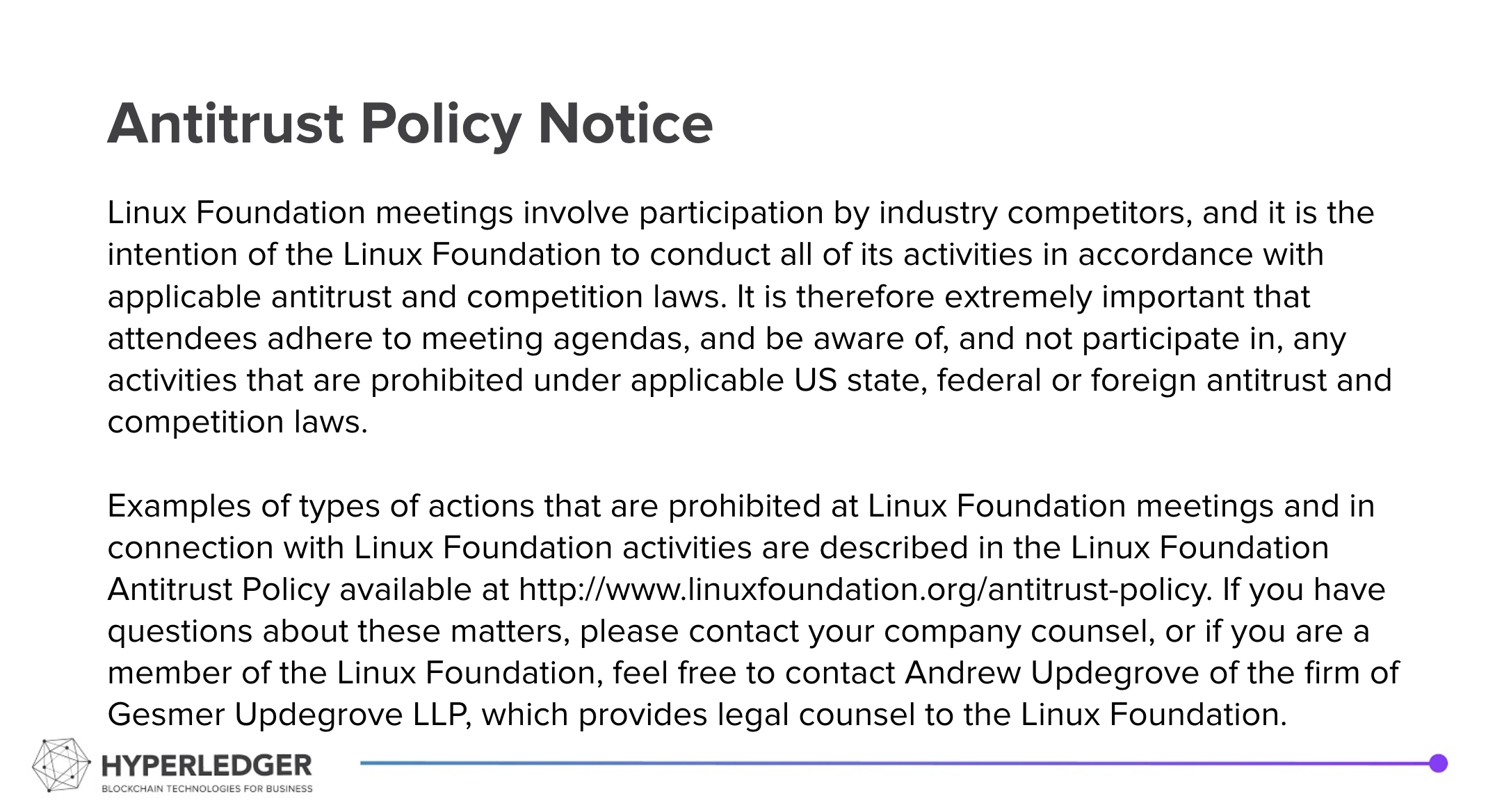Planned:
- Welcome new members, including new member introductions
- Updates / needs from CA2SIG Working Groups
- Consumer Disclosure WG
- Carbon Accounting WG
- Standards WG
- Climate Research WG
- Discussion Topic: How might we explore the issue of governance for climate action and accounting?
Recording:
Hyperledger is committed to creating a safe and welcoming community for all. For more information please visit the Hyperledger Code of Conduct. |
|---|
Time:
- Tuesday, September 21, 2021, at 8 AM Pacific
- Add Climate Action and Accounting SIG calls to your calendar
Dial-In Information: [ZOOM]
You can join either from your computer or from your phone:
- From computer: https://zoom.us/j/4034983298?pwd=STZQd0xMZU9xRVVOVnpQM3JNQ2dqZz09
- From phone: +1(855)880-1246 (toll free US number) or view International numbers
- Meeting ID: 403 498 3298
Meeting Notes
Attendees: 15
High level updates on existing CA2SIG Projects
Introduction to the topic of Governance including the importance of governance to both blockchain and Global Climate Accounting
Governance as use case: The voluntary carbon credit market - existing work that is being conducted by the Task Force for Scaling Voluntary Carbon Markets
Introduction to Wiki Pages that have been created for Governance and Governance Use Cases
High level overview of the multistakeholder governance model of ICANN and the governance of the Global Domain Name System
Discussion of how to focus on Governance within the Scope of the SIG
Notes from Chat:
08:05:15 From Bobbi Muscara to Everyone:
New members to Hyperledger Community, guide to get started contributing to the community:https://wiki.hyperledger.org/display/LMDWG/New+Member+Welcome+Page
08:09:26 From Tim Lipp to Everyone:
Very interesting, and applicable for me, thank you. https://schema.org/
08:09:44 From Alex Ivan Howard to Everyone:
https://schema.org/
08:10:19 From Alex Ivan Howard to Everyone:
"Schema.org is a collaborative, community activity with a mission to create, maintain, and promote schemas for structured data on the Internet, on web pages, in email messages, and beyond."
08:12:52 From Robin Klemens to Everyone:
I know schema.org in the context of SSI (DIDs and VCs). We could take about this in a future call
08:23:17 From Tim Lipp to Everyone:
That's a great point, staying in the bubble is a real risk.
08:24:42 From Jim Goldmann, Jr. to Everyone:
I think you are already connecting in the dots by enabling new unique thinking in how this is completed. I am seeing pushback by organizations that are already in the “business” that are creating barriers to the rational evolution of the industry.
08:37:23 From Tim Lipp to Everyone:
Very clear baseline example, thank you. In many ways the governance is a function of skin in the game/investment and the structure through which that is communicated.
08:38:21 From Aaron Rosenberg to Everyone:
Traversing many stakeholder groups efficiently will require s kind of portable reputation. At GitHub, OS and commercial reputation are rooted in the contributor action (commit, pull request, issue). The commit is special, because it can leave GitHub. Thinking about how to account for reputation at the base layer (token?) could allow for different governance systems grow on top.
08:39:58 From Bobbi Muscara to Everyone:
The Directory is maintained and financed by who?
08:40:32 From Elisabeth Green to Everyone:
On bc, whoever broadcasts has a voice. Is that anyone but the node operator? The node operator has a stake in validating only verified credentials. Node operators have a stake in the integrity of the bc. The node operator could lose her stake by violating the bc regulations. In the VCOD, your carbon credit is your voice. Those with carbon debt are limited to asking creditors to bail them out.
08:41:58 From Elisabeth Green to Everyone:
federation of public communities?
08:42:33 From Jim Goldmann, Jr. to Everyone:
https://calgarycommunities.com/
08:43:45 From sichen to Everyone:
“The Directory is maintained and financed by who?” —> right now it is an open source project that we’ve worked on out of interest with help from Linux Foundation mentees. It could keep going at this level but if there is a group of companies involved it could grow a lot more.
08:45:25 From sichen to Everyone:
“Traversing many stakeholder groups efficiently will require s kind of portable reputation. At GitHub, OS and commercial reputation are rooted in the contributor action (commit, pull request, issue). The commit is special, because it can leave GitHub. Thinking about how to account for reputation at the base layer (token?) could allow for different governance systems grow on top.” —> Interestingly I don’t know of any open source project that has a formal reputation system. It seems open source projects are very small and informal. Then stackoverflow has created a formal reputation system and monetized open source developers’ reputations.
08:50:07 From sichen to Everyone:
“Traversing many stakeholder groups efficiently will require s kind of portable reputation. At GitHub, OS and commercial reputation are rooted in the contributor action (commit, pull request, issue). The commit is special, because it can leave GitHub. Thinking about how to account for reputation at the base layer (token?) could allow for different governance systems grow on top.” —> In this case the node operators could be thought of as the contributors of data — the developers, the buyers, etc.
08:50:24 From Tim Lipp to Everyone:
I love that.
08:51:31 From Jim Goldmann, Jr. to Everyone:
Who and how will they interact and use it
08:51:50 From Elisabeth Green to Everyone:
Is there time for voting on bc? Or is there only the opportunity for a node operator to claim that a credential is valid or invalid? If there is a conflict between node operators, they seek more verification.
08:53:55 From Elisabeth Green to Everyone:
Governing transfers of carbon credit.
08:54:12 From sichen to Everyone:
There would be voting similar to an oracle to challenge the data.
08:55:06 From Elisabeth Green to Everyone:
If data from one source conflicts with data from another, node operators must analyze data or seek more data.
08:56:16 From sichen to Everyone:
Yes, the node operator functions as an arbitrator of sorts.
08:57:49 From Bobbi Muscara to Everyone:
Was working on this web site. I was developing it as commercial endeavor from working group, www.globalenergychain.com (live for just today).
08:57:49 From Elisabeth Green to Everyone:
The node operators earn approximately 10% of the credit transferred at NORI, as an incentive.
08:58:18 From Aaron Rosenberg to Everyone:
At GitHub we see (and facilitate) investment by Fortune companies into OS because they are incentivized to secure their software supply chain
09:01:43 From Elisabeth Green to Everyone:
https://www.coindesk.com/nori-blockchain-carbon-credits-funding-round validator does not earn anything for validating credentials but may validate a transfer of a tonne for a one-ton token and keep the difference, which is 0.10231 ton of carbon, like NORI does, i.e., a transfer of a long tonne of CO2e for a short ton token.
09:02:54 From Elisabeth Green to Everyone:
One token is always worth one ton, but the price of the token will fluctuate based on supply and demand, Gambill explained. ... a token, representing one future ton of CO2 removed, is traded as a commodity." https://www.coindesk.com/nori-blockchain-carbon-credits-funding-round
09:03:40 From Tim Lipp to Everyone:
Fascinating example thank you for sharing Elisabeth!
09:09:45 From Elisabeth Green to Everyone:
NOAA maps out point sources of pollution. Verses could zoom into your neighborhood to see which of your neighbors is the point source of the pollution you breathe.
09:11:16 From Elisabeth Green to Everyone:
Don't target me!
09:11:54 From Christiaan Pauw to Everyone:
Have to leave. Bye Everyone. Very interesting discussion
09:12:01 From Elisabeth Green to Everyone:
Vote for Bobbi for TSC Chair!
09:12:02 From Tim Lipp to Everyone:
Yes, freedom and security is a huge part of this conversation.
09:12:45 From Aaron Rosenberg to Everyone:
Liquid democracy is a model for voting and delegation which is quite interesting https://medium.com/@memetic007/liquid-democracy-9cf7a4cb7f
09:13:19 From Tim Lipp to Everyone:
Yes, I'm working on trying to apply liquid democracy in Calgary's next election.
09:16:32 From Tim Lipp to Everyone:
Very interesting, thank you.
09:17:22 From Tim Lipp to Everyone:
I've got to run everyone, thank you so much for your work and your time in this conversation! Feel free to add me on LinkedIn. https://www.linkedin.com/in/tim-lipp/
09:19:13 From Elisabeth Green to Everyone:
How are courts, judges, validating evidence that could be deep fakes?
09:21:12 From Aaron Rosenberg to Everyone:
https://github.com/liquid-donations/reimagine-giving
Attendees: 20


